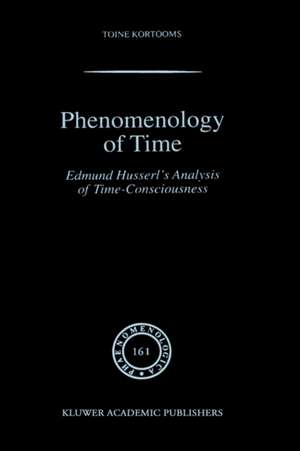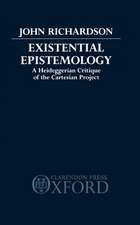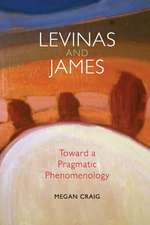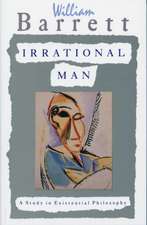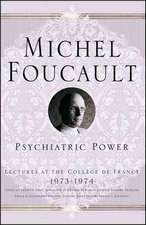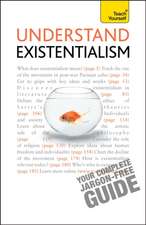Phenomenology of Time: Edmund Husserl’s Analysis of Time-Consciousness: Phaenomenologica, cartea 161
Autor Toine Kortoomsen Limba Engleză Hardback – 28 feb 2002
Central themes in the discussion of Husserl's phenomenology of time in this book are: the connection between the analysis of time-consciousness and the analysis of phantasy-consciousness and image-consciousness; Husserl's position in the debate between A. Meinong and W. Stern concerning the possibility of the perception of time; the self-constitution of absolute time-consciousness; the influence of Husserl's development of genetic phenomenology on his analysis of time-consciousness; and the question of the intentional character of time-consciousness.
| Toate formatele și edițiile | Preț | Express |
|---|---|---|
| Paperback (1) | 945.92 lei 6-8 săpt. | |
| SPRINGER NETHERLANDS – 4 dec 2010 | 945.92 lei 6-8 săpt. | |
| Hardback (1) | 952.09 lei 6-8 săpt. | |
| SPRINGER NETHERLANDS – 28 feb 2002 | 952.09 lei 6-8 săpt. |
Din seria Phaenomenologica
-
 Preț: 690.19 lei
Preț: 690.19 lei - 20%
 Preț: 816.33 lei
Preț: 816.33 lei - 13%
 Preț: 478.40 lei
Preț: 478.40 lei - 20%
 Preț: 629.12 lei
Preț: 629.12 lei - 13%
 Preț: 491.46 lei
Preț: 491.46 lei - 13%
 Preț: 542.55 lei
Preț: 542.55 lei - 20%
 Preț: 553.67 lei
Preț: 553.67 lei -
 Preț: 690.38 lei
Preț: 690.38 lei - 15%
 Preț: 633.02 lei
Preț: 633.02 lei -
 Preț: 417.90 lei
Preț: 417.90 lei -
 Preț: 425.42 lei
Preț: 425.42 lei -
 Preț: 389.49 lei
Preț: 389.49 lei -
 Preț: 418.29 lei
Preț: 418.29 lei -
 Preț: 417.02 lei
Preț: 417.02 lei - 15%
 Preț: 577.72 lei
Preț: 577.72 lei - 15%
 Preț: 527.32 lei
Preț: 527.32 lei - 15%
 Preț: 636.80 lei
Preț: 636.80 lei - 18%
 Preț: 952.89 lei
Preț: 952.89 lei - 15%
 Preț: 643.65 lei
Preț: 643.65 lei - 18%
 Preț: 1225.48 lei
Preț: 1225.48 lei -
 Preț: 389.31 lei
Preț: 389.31 lei - 18%
 Preț: 1113.39 lei
Preț: 1113.39 lei - 18%
 Preț: 952.40 lei
Preț: 952.40 lei - 18%
 Preț: 1664.61 lei
Preț: 1664.61 lei - 18%
 Preț: 1551.73 lei
Preț: 1551.73 lei - 18%
 Preț: 1222.31 lei
Preț: 1222.31 lei - 18%
 Preț: 944.19 lei
Preț: 944.19 lei - 15%
 Preț: 642.51 lei
Preț: 642.51 lei - 18%
 Preț: 1112.78 lei
Preț: 1112.78 lei - 18%
 Preț: 891.80 lei
Preț: 891.80 lei - 18%
 Preț: 948.47 lei
Preț: 948.47 lei - 18%
 Preț: 1224.18 lei
Preț: 1224.18 lei - 18%
 Preț: 946.87 lei
Preț: 946.87 lei - 15%
 Preț: 578.84 lei
Preț: 578.84 lei - 15%
 Preț: 464.18 lei
Preț: 464.18 lei
Preț: 952.09 lei
Preț vechi: 1161.08 lei
-18% Nou
182.21€ • 189.73$ • 153.99£
Carte tipărită la comandă
Livrare economică 10-24 martie
Specificații
ISBN-10: 1402001215
Pagini: 328
Ilustrații: XX, 304 p.
Dimensiuni: 155 x 235 x 23 mm
Greutate: 0.64 kg
Ediția:2002
Editura: SPRINGER NETHERLANDS
Colecția Springer
Seria Phaenomenologica
Locul publicării:Dordrecht, Netherlands
Public țintă
ResearchCuprins
Table of Contents. Acknowledgements. Introduction. Part 1: Husserl's Analysis of Time-Consciousness in the Lecture Course from WS '04/'05. 1. The Context of Husserl's First Analysis of Time-Consciousness. 2. The First Analysis of Time-Consciousness. 3. Developments in the Years Following the Lecture Course from WS '04/'05. Part 2: Husserl's Analysis of Time-Consciousness in the L-Manuscripts. 4. Three Models for the Description of the Structure of Time-Consciousness. 5. The Perspective of Genetic Phenomenology. Part 3: Husserl's Analysis of Time-Consciousness in the C-Manuscripts. 6. The Last Analysis of Time-Consciousness. Abbreviations. Bibliography. Index of Names.
Caracteristici
Descriere
Edmund Husserl occupied himself with the analysis of time-consciousness throughout his life. In this book, the three stages that may be distinguished in Husserl's occupation with this theme are discussed in their interrelationship. The first stage consists of a lecture manuscript from 1905; the second stage consists of the so-called Bernau manuscripts, research manuscripts that were written in 1917 and 1918; and the final stage consists of the so-called C-manuscripts, research manuscripts that were written in the late 1920s and the early 1930s.
Central themes in the discussion of Husserl's phenomenology of time in this book are: the connection between the analysis of time-consciousness and the analysis of phantasy-consciousness and image-consciousness; Husserl's position in the debate between A. Meinong and W. Stern concerning the possibility of the perception of time; the self-constitution of absolute time-consciousness; the influence of Husserl's development of genetic phenomenology on his analysis of time-consciousness; and the question of the intentional character of time-consciousness.
